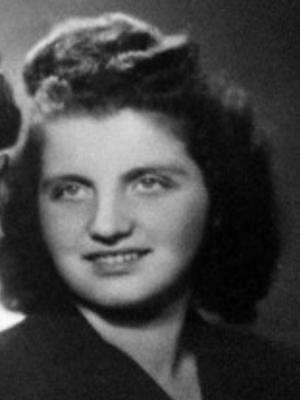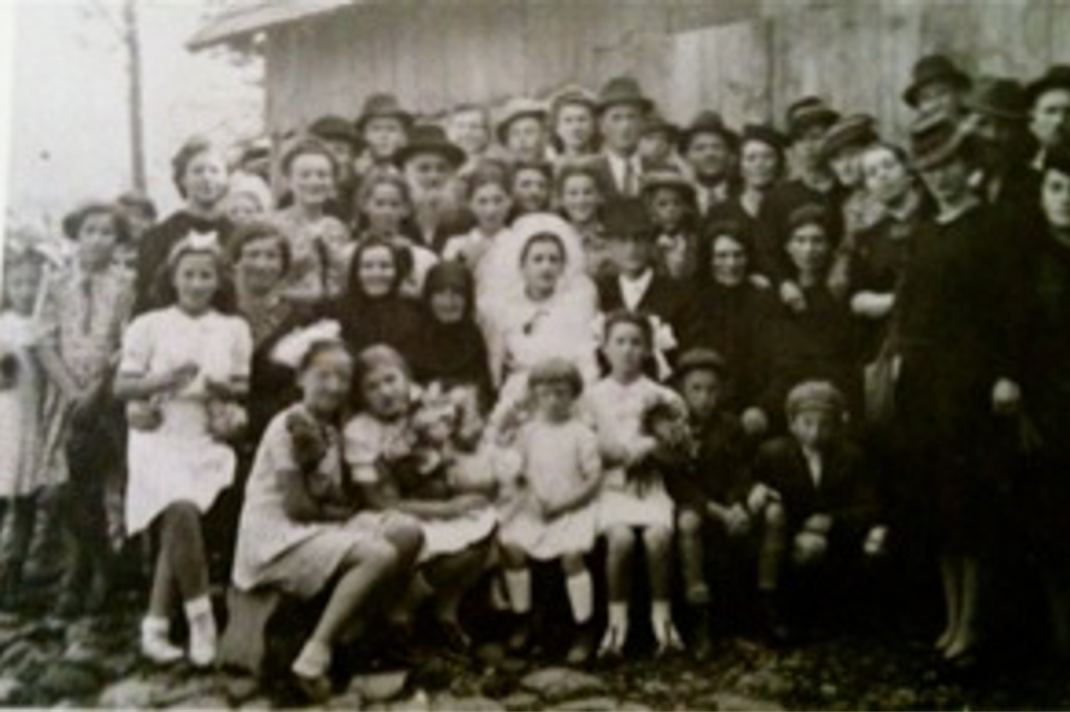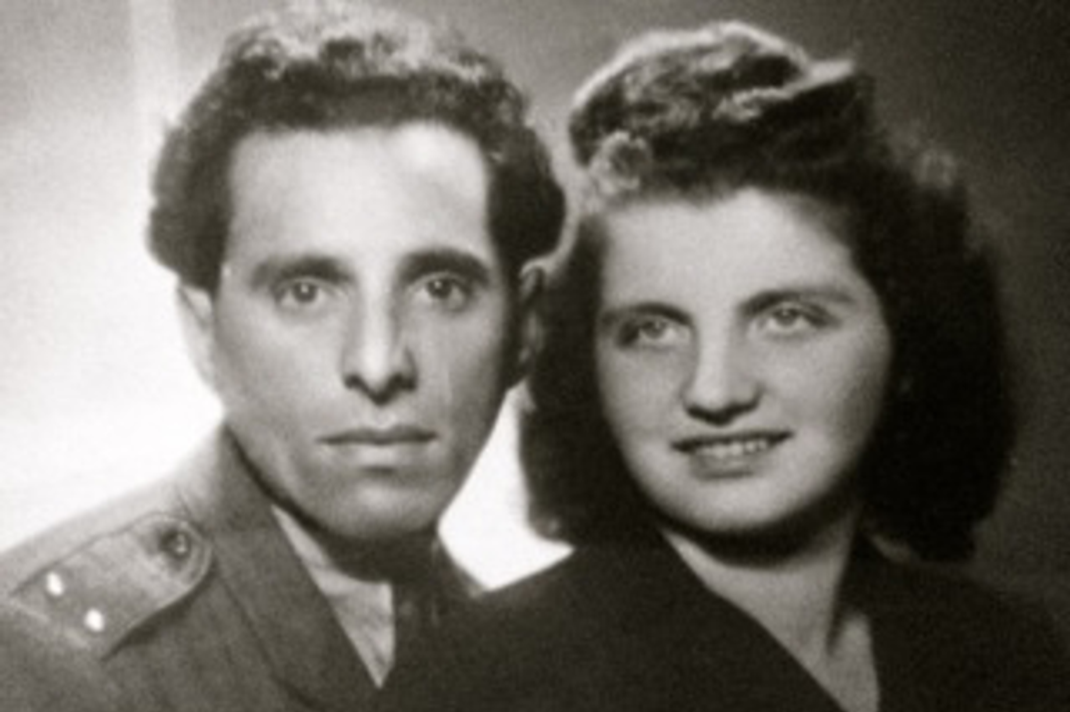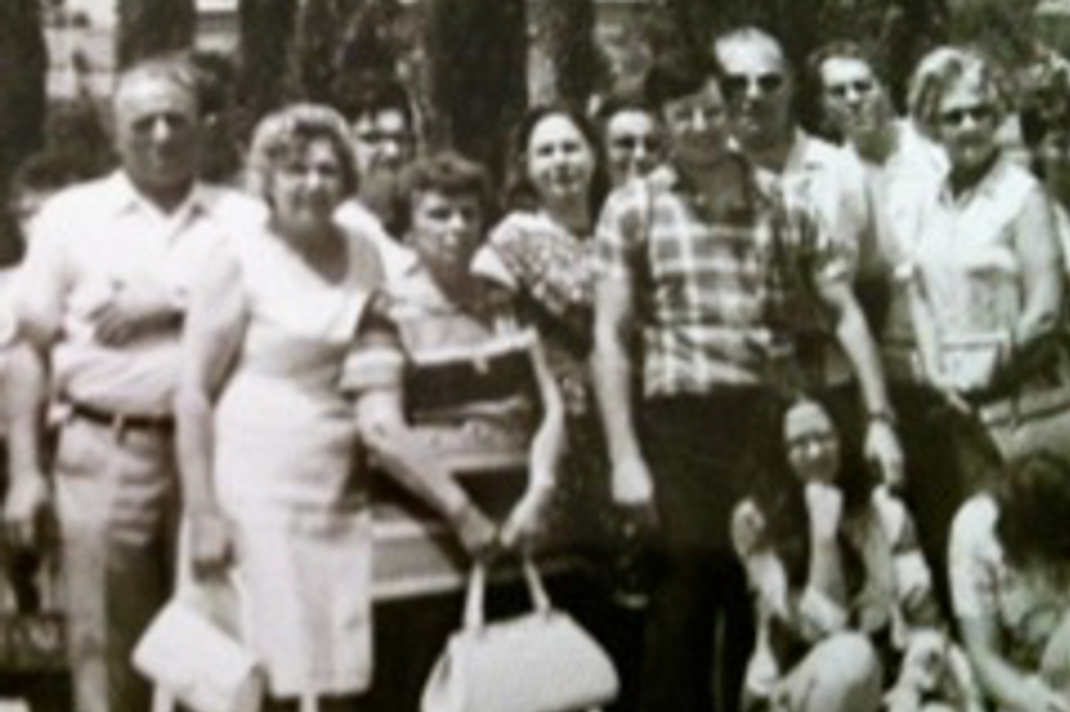Lenka Kaufman

Born: Huklivý, Czechoslovakia (now Huklyvyi, Ukraine), 1925
Wartime experience: Ghetto and camps
Writing partner: Etta Anisef
Lenka Kaufman was born in the village of Huklivý, Czechoslovakia (now Huklyvyi, Ukraine), in 1925. In 1939, her hometown came under the control of Hungary, and her father was conscripted for forced labour under anti-Jewish laws.
Lenka and her sister Dora were living and working in Budapest when Germany occupied Hungary in March 1944. In April, soon after Lenka returned home to Huklivý, she and the rest of her family were rounded up by gendarmes and sent to the ghetto in Munkács (now Mukachevo, Ukraine). Several weeks later, Lenka and her family were deported to Auschwitz-Birkenau. In the fall of 1944, Lenka was sent on a transport to work in a factory near Schkopau, Germany. When the Allies began bombing the factories, she and the other forced labourers were taken by train to the Theresienstadt ghetto and concentration camp, where they were liberated by the Soviet army on May 8, 1945. Lenka reunited with her two surviving siblings after the war, and they lived together in Munkács and then in the town of Jirkov. In December 1945, Lenka met and married Mendel Kaufman, and they soon started a family. In 1949, they left for Israel, and two years later they immigrated to Canada, settling in Montreal. Eventually, Lenka and her family moved to Toronto to be with her sister and her family. Lenka Kaufman passed away in 2015.
A Short Peace
Some of my best memories are of the Jewish holidays, when we were taken into the city to buy new clothes for the yom tovim. My parents usually dressed my sisters and me in navy blue dresses, but one time, my parents bought us white-and-black sailor dresses in a houndstooth pattern. We were the only girls in school who had those dresses. I felt so proud when I wore that dress to school on Monday, but then someone poured liquid on my new dress. I was upset and cried for a long time. I wasn’t afraid of what my mother would do or say because she was a very good person, but I was worried that my dress was ruined. It wasn’t done accidentally, but on purpose. The kids in school called me “teacher’s pet” and they wanted to show me up. That incident stuck in my mind for many years.
We had a very peaceful life in Huklivý until the Hungarians arrived in 1939. The Czech gendarmes moved out, and the Hungarians moved in. My parents had gone to Hungarian schools because Huklivý was part of the Austro-Hungarian Empire when they were growing up, so they didn’t think that it would be so bad when the Hungarians came back, but then every week there was something else against the Jews. The first thing the Hungarians did was to take away all the business permits from the Jews. My father had permits that allowed him to conduct business with the Czech government, but the Hungarians took them all away. Life for my family became very difficult after that. Every day, there was another decree stating what we were forbidden to do.
In 1939, the Hungarians put up posters throughout the town ordering Jewish men up to the age of forty-five to report for work duty. My father, along with the other Jewish men from our town, were sent to work camps on the Soviet front where they built roads and bridges and assisted the German soldiers. They had to wear armbands, which showed they were Jewish, instead of military uniforms. My mother stayed on the farm with us children, and nearby workers and peasants stole from us. They took all the wood and stones from my father’s business because they knew that they could do whatever they wanted and that no one would come to the defence of a Jew. We were left with only a few cows and chickens. Before 1939, the peasants worked the fields on our property, and in return they were able to keep a third or a half of what grew in the fields; however, once the Hungarians came in, they took everything for themselves.
Then the Czech schools were closed, and the Jewish children couldn’t go to high school anymore. I had to go to a local Russian school but I hated it because the teachers knew less than I did. I was only there for a short time, not even six months, because I had to leave school when I turned fourteen, since Jewish children were not allowed to continue their education after age fourteen. There was nothing to do after that. My older sister Dora went to Munkács, Hungary, to learn how to become a seamstress, and I stayed at home to help my mother look after my younger siblings. We had always had a maid who helped out with the children and a man who worked in the stables, but after my father was conscripted to the labour service, we could only afford a woman to come in occasionally to wash the floors and do the heavy work. The man continued to work because my father was no longer there and someone had to take care of the cows and the stables.
In 1941, my mother sent my sister Dora and me to Budapest. My father had two brothers living in Budapest, and my mother decided to send us there because she didn’t want us to hang around with nothing to do. Budapest was a big city, and she thought that my father’s brothers could find work for us. However, when we got there we discovered that we didn’t like our uncles very much. Their lives were so different from ours. Our uncles didn’t observe Jewish traditions and they invited us to meet them in a café rather than at their homes. We weren’t used to their lifestyle and felt uncomfortable around them, so we decided to go to the Jewish aid service to look for work. While we were there, we met someone who was looking for girls to work as seamstresses in a dress factory, so we rented a room in an apartment and went to work in the factory sewing dresses.
In March 1944, the Germans marched through Budapest. Oddly enough, my sister and I slept through this. I decided that I would go home for the Passover holidays in April, and my sister decided to stay in Budapest. We had always gone home at Passover, and this was the first time that she decided not to go home. As a result, I went with my family to Auschwitz-Birkenau, and Dora went into hiding.

The First Night
When I returned to Huklivý in April 1944 for the Passover holidays, my father was at home. He had been allowed to leave the work camp in 1943 when he turned forty-five and had returned home to be with his family. On the last day of Passover, the gendarmes went from house to house and told all the Jews to get ready to leave. We were not supposed to take anything with us except for our clothes and some blankets. People left their cows, their chickens, their dishes… everything.
We went by train to a ghetto in Munkács. It was horrible there. There was no food; people were hungry and sick. They forced every child under the age of fourteen to cut off all their hair. My beautiful little sister had long blond hair and she too had to have her hair cut off. We stayed in Munkács for several weeks and then we were sent to Auschwitz-Birkenau. My parents and I, my four brothers and my sister, my grandmother, my aunt and her four children were all transported to Auschwitz-Birkenau by cattle car trains.
When we arrived at Auschwitz-Birkenau, we were told to leave everything on the train, even the few shmattes, rags, that we brought with us. We had hidden the men’s tefillin, phylacteries, and carried them with us from the train where the selection took place to the zone where we were deloused. An SS man ordered people to go to the left or to the right. I wanted to go with my mother and my little brothers and sister, but the SS man took my arm and pushed me to the other side. I said, “Das ist meine Mutter. Ich gehe mit meiner Mutter.” (That’s my mother, I’m going with my mother.) And he came after me and he said, “You’re going there.” I ran after them and I kissed my mother and I kissed my brothers and sister. The SS man took my arm and threw me to the other side. That SS man saved my life. After the war, when I told one of my sons that an SS man saved my life, he said, “No. He needed you for work.”
My little sister, Henchie, might have been saved from the crematorium if she hadn’t been forced to have her hair cut off in the ghetto, because she was very beautiful and could have passed for being older before her hair was cut. But the SS knew that she was younger than fourteen because of her shorn hair, and so she was told to go with my mother and the other children. By morning, I knew that all my family was dead.
On the first night of our arrival, we were taken into the Birkenau camp. We saw fires burning where the bodies of the gassed people were thrown into the fire. We started screaming when they tried to take us to the showers because we thought we were going to be gassed. They brought one of the girls to show her that it was just showers and not gas. She came back and said, “They’re just showers. It won’t help us screaming here.” While I was waiting to go into the shower, I looked over to the other side where a group of men were standing and waiting to be taken into the showers. I saw my brother Benyamin waiting with the others. That would be the last time I would see him.
When we went into the shower, we had to take off all our clothes. They only let us take our shoes with us. Afterward, they cut off our hair and gave us a grey sack dress to put on. When I came out on the other side, my cousins were there and I didn’t recognize them and they didn’t recognize me without my hair and my clothes. The men who took away our clothes were Polish Jews who had already been working in Auschwitz for three years. They said, “You see the smoke, those are your parents and your siblings.”
We were then taken from Birkenau to the main Auschwitz camp. A few days later, we had numbers tattooed on our arms. I was given number A5978. You didn’t have a name anymore, just a number, and everyone was only called by number, never by name. The beds in the Lager had three levels like triple bunk beds, but instead of mattresses there were slats, and about ten girls slept on each level. We received a bowl of soup once a day that consisted of mostly water with something unrecognizable in it, and everyone was allowed one sip from the bowl. You could barely take a sip before it was pulled from you, and if you weren’t strong enough to hold on to the bowl, you didn’t get anything.
After a few days, they sent us to work in Birkenau to sort the clothes that they had brought from the crematoria. We had to separate the dirty and torn clothes and the shoes from the clean ones. Most of the clothes that came from the Lodz ghetto were soiled with shit because the people knew where they were going and they were really scared. Some of the clothes had gold, diamonds, watches and jewellery sewn in the hems. We were supposed to give everything to the Germans, but we threw a lot of the valuables into the toilet. The toilets weren’t flush toilets but big tanks with holes in them. We didn’t think about what would happen to us if they found out that we had thrown the jewellery and money into the toilet, because we believed it was the end of our lives and that none of us would survive.
After the war, when I told one of my sons that an SS man saved my life, he said, “No. He needed you for work.”
The Chaos at the End
In November 1944, five hundred women from Auschwitz were selected to work in a factory near Schkopau, Germany. I was selected to be part of that group, although I’m not sure why. None of my cousins were selected, nor anyone else from my barracks. In retrospect, I believe that the reason I was selected was because I had sewn a beautiful apron for one of the kapos, and to show her appreciation, she chose me to go.
We were taken from Birkenau to Schkopau by train, a distance of about four hundred kilometres, to work in a factory. It was a huge place with big machines and motors, and we were shown how to work the machinery. We stayed in a school and slept on the floor and were given a bowl with something to eat once a day. We still wore the same grey dresses that we had in Auschwitz. I had taken a blue wool kerchief from the clothes-sorting barracks in Birkenau just before we left, and on the first night we were in the school, somebody stole my kerchief. I begged the girls to give it back to me. I told them I would recognize the kerchief if anyone wore it, but I never got it back.
The factory managers put in three-tiered bunk beds on the top floor of the factory, and we were moved from the school to the factory. We were still given one meal a day, and although it was better than the watery gruel we got in Auschwitz, we were still incredibly hungry. My thoughts were always filled with how hungry I was. One time, I was working on a big machine and was so hungry that I couldn’t concentrate on what I was doing and almost fell into the machine. Luckily, a friend from a neighbouring town in Czechoslovakia, who worked beside me, pulled me down. I fell on the ground, but then I couldn’t get up. They called the nurse, who took me to her office. I was afraid they would send me back to Auschwitz. My throat was really sore, and the nurse gave me some pills and something to eat and drink. After a couple of days in the infirmary, I was sent back to work. Some of the German civilians who worked in the factory tried to help us by leaving pieces of bread by the machines, and they didn’t have very much food for themselves either by that time.
In early March 1945, the Americans started bombing the factories in the area of Schkopau. The windows in the room where we stayed had black paper on them to block the lights. One night, the blackout papers caught fire. All the girls ran to the large steel door and started banging and screaming to be let out. They always locked us in at night, so it was impossible to open the door from the inside. We thought that we would perish in the fire. I don’t remember how it happened, but the doors suddenly opened, and we ran out. Behind the factory was a large forest, and some of the girls ran into the forest. I didn’t get very far, though, and I’m not even sure how I made it out of the building. We were starving by then because we hadn’t had anything to eat since the Americans started bombing the factory. We ate whatever we found on the ground in the forest. When the bombings stopped, we all returned to the factory building. The Hauptsturmführer (captain) who was responsible for looking after us finally agreed to let us run into the woods whenever the sirens started to go, but he warned us, “If I find one girl missing, ten of you will be shot.”
By the end of March 1945, the Americans were on one side of Schkopau and the Soviets were on the other — we were caught in the middle. The Germans probably didn’t know what to do with us. Since the factory was no longer in operation, we were marched toward the train station. It was chaotic there, with trucks of soldiers going in all directions. We were given a piece of bread and margarine when we started marching. Most of the women ate their bread when they got to the train station, but I kept my bread for the longest time. It took a day or two for the train to arrive. I was afraid that if I kept the bread much longer someone would steal it, so I took one bite at a time. They put us on the cattle train, and we were there for eight days — five hundred women without water and food. The train felt like it was just going back and forth. My tongue was swollen. We begged the soldier who was guarding us to shoot us. And he said, “When I get the orders to shoot you, I’ll shoot you.” By some miracle, only four or five girls died during that ordeal. A train holding only men arrived in Theresienstadt around the same time as our train, and more than half of the men in that train were dead.
Weeks after we arrived in Theresienstadt, we suddenly heard screaming and shooting. At first we thought that the front had moved to Theresienstadt and that shooting was taking place between the Germans and the Soviets. But then we heard Russian being spoken. Everyone started to yell, “The Russians are here. The Russians are here!” The Soviets came in on May 8, and they liberated us. Everyone was hugging and kissing. People were running to the trucks and kissing the soldiers. I was still very sick and couldn’t get out of bed. A woman who had survived the war with her two daughters told us to stay low because we didn’t know where the bullets were flying. But when it quieted down, she brought me over to the window so that I could see that we were liberated.
At first everyone was hugging and kissing the soldiers, but shortly after that the soldiers started raping the women. My friend Raisel, who was only sixteen years old and very strong, wanted to go to the houses where Germans had lived to get some things that had been abandoned. I begged her not to go, but she didn’t listen to me. Quite a few of the girls went to see what was left behind in the German houses. When Raisel came back, she told me that she saw a girl being raped. The girl was crying and screaming, but nobody came to help her. When Raisel lay down, I saw that her clothes were covered with blood. I asked her, “Raisel, who was the girl”? She just said, “A girl.” Within three days, she was dead. The Soviet soldiers were horrible.



